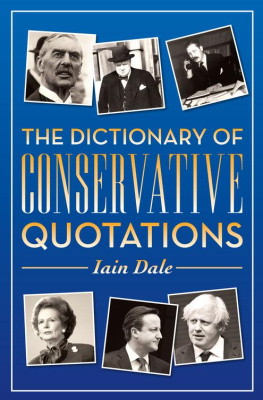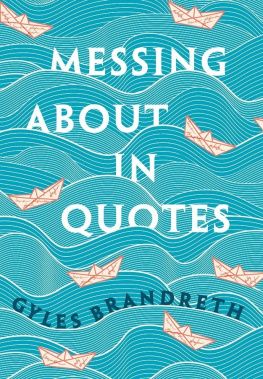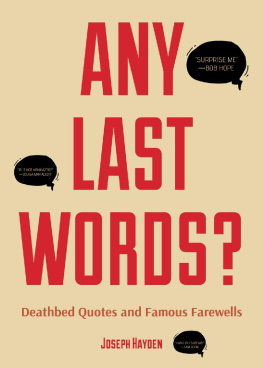Published by Times Books An imprint of HarperCollins Publishers Westerhill Road Bishopbriggs Glasgow G64 2QT www.harpercollins.co.uk timesbooks.co.uk First edition 2018 This compilation Times Newspapers Ltd 2018 The Times is a registered trademark of Times Newspapers Ltd All rights reserved under International and Pan-American Copyright Conventions. By payment of the required fees, you have been granted the non-exclusive, non-transferable right to access and read the text of this e-book on screen. No part of this text may be reproduced, transmitted, downloaded, decompiled, reverse engineered, or stored in or introduced into any information storage and retrieval system, in any form or by any means, whether electronic or mechanical, now known or hereinafter invented, without the express written permission of HarperCollins. The contents of this publication are believed correct at the time of printing. Nevertheless the publisher can accept no responsibility for errors or omissions, changes in the detail given or for any expense or loss thereby caused. A catalogue record for this book is available from the British Library.
Cover image Bettmann / Getty My thanks and acknowledgements go to Lily Cox and Robin Ashton at News Syndication and, in particular, at The Times, Ian Brunskill and, at HarperCollins, Gerry Breslin, Jethro Lennox, Karen Midgley, Kerry Ferguson, Sarah Woods and Evelyn Sword. eBook Edition November 2018 ISBN 9780008317263 Version: 2018-10-13
A good newspaper, said the writer Arthur Miller, is a nation talking to itself. Being a good newspaper,
The Times strives to be exactly that ideal. Being intelligent, too, it realised some years ago that one way to promote that end was to make use of the words of interesting people talking to others. As a consequence, in the Daily Universal Register section of every edition, next to the birthdays, the anniversaries and the plashings of voles, there began to appear a stimulating quotation or saying of note, of which this volume is a selection. Because the quotes which have appeared in the newspaper were assembled on random lines, this is not intended to be a traditional, comprehensive dictionary of famous quotations as such, though I hope it is nevertheless a valuable work of reference.
Rather, the content has been grouped into common themes. Again, the hope is that, taken together in this way, these insights, musings and witty observations will provide food for thought. Those readers who wish to find quotes from specific people can easily do so by consulting the index at the back of the book. Winston Churchill, the originator of a memorable line or two himself, believed it a good thing for an uneducated man to read books of quotations. He may have been playing up his own inattentiveness as a schoolboy, but what can the rest of us gain from a ramble through the thoughts of greater minds? One thing is that they do think alike. Over the centuries, the same subjects and reflections recur, for after all much is constant in the human race.
Often, too, even the words are similar, and at certain times in history seem to occur to people almost simultaneously. Was it William Faulkner or Andr Gide who said something about not being able to swim for new horizons without losing sight of the shore? And, besides being treated to some world-class lectures in the essentials of philosophy, politics, success and common sense, there is the satisfaction (and surprise) of discovering how many expressions that we use every day are actually quotations. Who first said he was going from the sublime to the ridiculous? Napoleon, while leaving Russia. Who held that hell could be paved with good resolutions (often misquoted as good intentions)? That was Mark Twain. And was it a logistics company or the polar explorer Fridtjof Nansen who advised that the difficult takes a little time, the impossible a little longer? Similarly, it is good to be reminded of the proper context of phrases often cited without knowledge of to what they refer. Making the pips squeak, a favourite standby of politicians, initially had nothing to do with taxing the rich.
It was coined in 1918 with regard to the scale of German reparations for the First World War. When Stanley Baldwin talked of newspapers having power without responsibility, he was himself quoting his cousin Rudyard Kipling, and when his successor as prime minister returned from Germany holding in his hand peace with honour, he was referencing a remark of his mid-19th century predecessor, Lord John Russell. In the preparation of the text, every effort has been made to attribute correctly the quotations chosen. Their sources have been given where they are known to be contemporaneous with or authored by the speaker. Where it might be helpful, an English translation is given from a foreign language. Remembrance of Things Past? Nothing to do with Proust originally, it comes from a Shakespeare sonnet.
Fools rush in; hope springs eternal; to err is human; even that Cup Final favourite sing-song about deaths sting all 18th century poet Alexander Pope. Let us salute Samuel Johnson as a compiler of dictionaries, but I cant agree with him that making and reading them is dull work. James Owen
He who does something at the head of one regiment, will eclipse him who does nothing at the head of a hundred. [Letter, 1861]
Abraham Lincoln, 16th president of the US (18091865) Those who believe that they are exclusively in the right are generally those who achieve something.
Proper Studies (1927)
Aldous Huxley, English writer and philosopher (18941963) Concentrate all of your thoughts upon the work at hand.
Alexander Graham Bell, Scottish-born scientist and inventor (18471922) Give me but one firm spot on which to stand and I will move the Earth.
Archimedes, Greek mathematician and physicist (287212 BC) Talent hits a target no one else can hit.
Archimedes, Greek mathematician and physicist (287212 BC) Talent hits a target no one else can hit.
Genius hits a target no one else can see. The World as Will and Representation (1819) Arthur Schopenhauer, German philosopher (17881860) For myself, losing is not coming second. Its getting out of the water knowing you could have done better. Ian Thorpe, Australian Olympic swimmer (1982) One secret of success in life is for a man to be ready for his opportunity when it comes. Benjamin Disraeli, prime minister of the UK (18041881) Well done is better than well said. The Price of My Soul (1969) Bernadette Devlin McAliskey, Irish civil rights leader (1947) It is easier to live through someone else than to become complete yourself. The Feminine Mystique (1963) Betty Friedan, American writer and activist (19212006) Discipline is the bridge between goals and accomplishment. Mother Teresa, Albanian nun and missionary (19101997) Its the stuff of dreams Kids from Kilburn dont become favourite for the Tour de France. Mother Teresa, Albanian nun and missionary (19101997) Its the stuff of dreams Kids from Kilburn dont become favourite for the Tour de France.
Youre supposed to become a postman or a milkman or work in Ladbrokes. Bradley Wiggins, British professional road racing cyclist (1980) The fact that some geniuses were laughed at does not imply that all who are laughed at are geniuses. They laughed at Columbus, they laughed at Fulton, they laughed at the Wright brothers. But they also laughed at Bozo the Clown. Brocas Brain (1979) Carl Sagan, American astronomer and educator (19341996) Diligence is the mother of good fortune, and idleness, its opposite, never led to good intentions goal.











